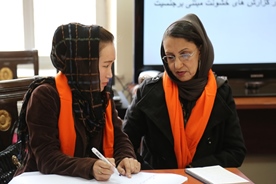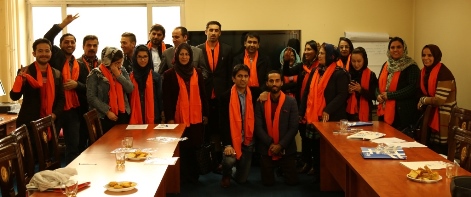 During group work, participants analyzed and discussed samples of broadcast and print reporting on GBV to apply ethical principlesKabul 25 November 2016 – WHO, together with UN Women, UNICEF, UNHCR and UNFPA, conducted a joint training workshop on ethical reporting on gender-based violence (GBV) in Kabul on 16 November 2016. The workshop aimed to increase journalists’ awareness and understanding of the different forms of GBV such as sexual, physical and emotional violence, and to enable them to apply ethical principles in their reporting, ensuring the safety and dignity of GBV survivors at all times.
During group work, participants analyzed and discussed samples of broadcast and print reporting on GBV to apply ethical principlesKabul 25 November 2016 – WHO, together with UN Women, UNICEF, UNHCR and UNFPA, conducted a joint training workshop on ethical reporting on gender-based violence (GBV) in Kabul on 16 November 2016. The workshop aimed to increase journalists’ awareness and understanding of the different forms of GBV such as sexual, physical and emotional violence, and to enable them to apply ethical principles in their reporting, ensuring the safety and dignity of GBV survivors at all times.
The workshop was organized as part of an annual global campaign “16 Days of Activism against Gender-based Violence” running from 25 November, the International Day for the Elimination of Violence against Women, to 10 December, Human Rights Day.
GBV, rooted in gender inequality, is widespread in Afghanistan – research shows that more than 80% of women experience at least one form of domestic violence and over 60% of women experience multiple forms of violence in their lifetime.
During the one-day workshop, 20 Afghan journalists from various print and broadcast media learned about the key ethical principles around GBV reporting, such as confidentiality, safety and privacy, and practiced methods to conduct safe and ethical interviews with survivors. Participants were also familiarized with the different forms of gender-based violence as well as the health, protection and legal aspects of GBV.
Journalists play a key role in GBV prevention and response as they can raise public awareness around the issue and highlight existing gaps in service provision and response while acting as catalysts for wider discussion and debate around GBV.
“This is a very important training because GBV is very common in Afghanistan but journalists don’t have proper knowledge on how to cover these issues and apply ethical guidelines. One major issue is that journalists often don’t know about ‘informed consent’ and they sometimes tell the survivors what to say in the interview,” said Ahmad Seyar, who has worked as a reporter at BBC radio for 8 years.
Applying ethical principles in reporting guarantees the safety of GBV survivors and ensures that survivors are not further traumatized and put in danger by, for example, exposing their identity. The workshop encouraged journalists to seek different angles when reporting on GBV, rather than merely relying on interviews with survivors.
“This training was very useful for me because I learned a lot about the different types of gender-based violence overall and important ethical issues around reporting. I already have some experience in reporting on these issues but this was a good way to refresh my skills and ensure I apply the right ethical principles,” said Frishta Faizy, reporter at Radio Killid.
 The journalists wore orange scarves to show their support for the 16 Days of Activism against GBV campaign launched on 25 November“This workshop was very hands-on and practical and it has helped me reconstruct the way I report about GBV. Especially in the coming 16 Days of Activism against gender-based violence campaign, we will be reporting a lot more on these issues so it is very important to apply the these ethical principles, such as do-no-harm and confidentiality,” said Shakila Naseri, head of media relations at the Ministry of Women’s Affairs.
The journalists wore orange scarves to show their support for the 16 Days of Activism against GBV campaign launched on 25 November“This workshop was very hands-on and practical and it has helped me reconstruct the way I report about GBV. Especially in the coming 16 Days of Activism against gender-based violence campaign, we will be reporting a lot more on these issues so it is very important to apply the these ethical principles, such as do-no-harm and confidentiality,” said Shakila Naseri, head of media relations at the Ministry of Women’s Affairs.
GBV includes sexual violence and rape, violence related to harmful traditional practices such as “honour” killings, child marriages and ‘baad’, the selling of women and girls to settle disputes. Although men and boys can also be victims of GBV, women are particularly affected.
Gender-based violence has multiple consequences for physical, reproductive and mental health and it is an urgent public health priority in Afghanistan. This is why in 2015, WHO supported the launch of the country’s first-ever GBV Treatment Protocol for healthcare providers and is currently implementing a 5-year-project with the Ministry of Public Health to strengthen health sector response to GBV.
Related links
WHO Afghanistan's Gender, Equity and Human Rights Programme
GBV Treatment Protocol for Healthcare Providers in Afghanistan


